Lung cancer patients receive more radiation than recommended

Unnecessary radiation treatments for lung cancer patients can cause toxicity and difficulty in swallowing.
Almost half of patients with advanced lung cancer receive more than the recommended number of radiation treatments to reduce their pain, according to a new study published in the Journal of the National Cancer Institute.
Radiation therapy that is palliative, or not intended to cure, can reduce the pain from lung tumors and improve quality of life. But unnecessary treatments mean increased cost and needless trips to the hospital. They can also cause radiation toxicity and difficulty in swallowing.
Guidelines developed from clinical trials recommend no more than 15 radiation treatments for pain in stage 4 lung cancer. The guidelines recommend patients not receive chemotherapy at the same time, to reduce the risk of toxicity.
The new analysis looked at 47,000 patients who received palliative radiation for stage 4 lung cancer in the U.S. between 2004 and 2012 and found that about one in five had received chemotherapy at the same time. Nearly a third of patients received more than 25 radiation treatments — 10 above the recommended maximum.
“There’s a lot of treatment of late-stage lung cancer with palliative radiation that goes beyond what is recommended by several national guidelines and multiple clinical trials,” said Matthew Koshy, a UI Health radiation oncologist and the study’s lead author.
“More education is needed for radiation oncologists, to prevent overtreatment — which has not been proven to further improve symptoms or quality of life, and can have some significant side effects,” Koshy said.
Most likely to be overtreated were privately insured patients and patients treated at community cancer centers without ties to an academic institution.
“Having private insurance was the No. 1 predictor of being overtreated,” Koshy said.
Koshy said physicians might tend to overtreat privately insured patients because services are billed per treatment. “It could also be because these patients may be perceived to have better potential for a more positive outcome,” he added.
Categories
Topics
cancer, health care, health care cost, lung cancer, pain, palliative care, radiation
